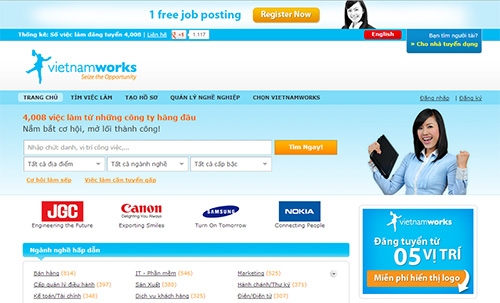Vietnamworks reports solid Q1 for employment

This was revealed in the company's annual survey of its customers, and was a key finding in the VietnamWorks' first Online Employment Report for 2013.
“When our team looked at our data, we saw very strong correlations between our numbers and those of government, economic and financial institutions. In many ways this is logical – when companies are investing and launching new projects, they need the team to make that happen – and in our 11 year history, we have built a reputation as the preferred partner of over 10,000 employers in Vietnam as their partner for recruitment,” said Carlton Pringle, CEO of VietnamWorks. “As such, we decided to go public with some of our opinions on Vietnam's recruitment industry and the way in which we see it presently headed.”
In comparing 2013's first quarter to that of 2012, the company reported stability in the total number of job postings that it experienced.
“While this stability in total jobs may sound a little unexciting, we regard it as a great base for the rest of the year,” Pringle added. “2013 kicked off in a period of high inflation and general growth, and high wage inflation had more people moving jobs and so on, so our Q1 numbers reflected that. 2013 commenced with the hangover of late-2012, and general economic malaise, so to return an almost identical quarter year on year is quite a solid foundation for a strong 2013.”
“Further – and most encouragingly – we saw our best week in history at the end of February 2013, followed by a strong month in March with year on year 9 per cent growth in terms of job postings.”
Other important findings from the company's research revealed Hanoi as currently the best city in the nation to find a job, ahead of Ho Chi Minh City and Danang, according to a ratio that measures the number of listings to the working age population of the three major cities.
The best industries for young job seekers remain IT – notably in software development in Danang where job growth in this industry has tripled; electronics (up 28 per cent); consulting (up 32 per cent); textile and footwear (up 38 per cent); pharmaceuticals and bio-tech (up 66 per cent); and retail and wholesale (up 105 per cent) all proved themselves quite recession-proof and all reporting listing growth year on year.
Various administrative/clerical industries, marketing, and architecture/interior design did not fare as well, reporting declines of 38 per cent, 31 per cent, 23 per cent respectively.
“Competitiveness remains hottest for roles in administration and accounting and import/export roles, where we typically see the highest numbers of applications per job and the most job seekers specifying those industries as desired employers,” said Pringle. “Conversely the NGO sector, the legal profession, medical and healthcare industries and agriculture are all reporting skills shortages, meaning that employers have to work very hard to offer compelling packages and work environments to attract the best talent in those fields.”
What the stars mean:
★ Poor ★ ★ Promising ★★★ Good ★★★★ Very good ★★★★★ Exceptional
Latest News
More News
- Congratulations from VFF Central Committee's int’l partners to 14th National Party Congress (January 25, 2026 | 09:46)
- List of newly-elected members of 14th Political Bureau announced (January 23, 2026 | 16:27)
- 14th Party Central Committee unanimously elects To Lam as General Secretary (January 23, 2026 | 16:22)
- List of members of 14th Party Central Committee announced (January 23, 2026 | 09:12)
- Highlights of fourth working day of 14th National Party Congress (January 23, 2026 | 09:06)
- Press provides timely, accurate coverage of 14th National Party Congress (January 22, 2026 | 09:49)
- Press release on second working day of 14th National Party Congress (January 22, 2026 | 09:19)
- Minister sets out key directions to promote intrinsic strength of Vietnamese culture (January 22, 2026 | 09:16)
- 14th National Party Congress: Renewed momentum for OVs to contribute to homeland (January 21, 2026 | 09:49)
- Party Congress building momentum for a new era of national growth (January 20, 2026 | 15:00)
















 Mobile Version
Mobile Version